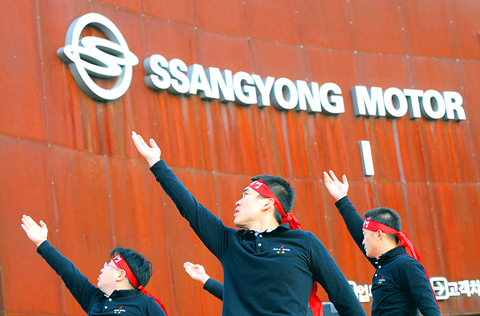Chinese-owned Ssangyong Motor of South Korea, hit by falling auto sales in the face of the global slowdown, said yesterday it had applied for court receivership to avoid bankruptcy.
Just two weeks after the automaker was turned down for new bank loans, the company said its Chinese parent Shanghai Automotive Industry Corp (上海汽車) had decided the move at an emergency meeting of its board on Thursday.
“The board of directors decided to apply for a court receivership in order to cope with the current liquidity crisis and turn the company into an entity capable of continuous growth,” Ssangyong said in a statement.

PHOTO: AFP
“At the same time, we will work out measures to normalize the company, and execute them strongly,” it said.
The application was filed with the Seoul central district court yesterday, a spokesman said. He said the courts will now decide “whether the company should be kept afloat or be liquidated.”
The court is expected to order Ssangyong Motor assets to be frozen to protect them from creditors before making a ruling on whether the company should be rescued or liquidated within a month.
It remains unclear whether there will be any appetite for Ssangyong among potential buyers as consumers are increasingly turning away from Ssangyong’s main line-up, Sports Utility Vehicles, amid the global economic crisis.
Ssangyong has fallen into financial crisis amid slow auto sales and a dearth of operating funds from its parent firm. It could not meet its payroll on time last month.
The state-run Korea Development Bank (KDB), Ssangyong’s main creditor, said late last month that it would not consider new loans unless Shanghai Automotive extended Ssangyong 320 billion won (US$250 million) of funding first.
In its statement, Ssangyong said it was facing a “serious liquidity crisis” because of the worldwide credit crunch and that losses were mounting in the current climate.
“The operating loss has been widening because of sharp falls in domestic sales and exports as well amid the global economic downturn,” the statement said.
Ssangyong expects to post a net loss of more than 100 billion won for last year.
Its sales reportedly slumped 29.6 percent last year to 92,665 units including 53,500 vehicles shipped abroad.
Its sales last month plunged 52.5 percent from a year earlier to 5,540 units. The board of directors also called for corporate restructuring, including redundancies and wage cuts.
The decision comes as the company’s labor union voted last week on a strike motion and was awaiting the outcome of the board meeting before deciding whether to count the ballots.

MORE VISITORS: The Tourism Administration said that it is seeing positive prospects in its efforts to expand the tourism market in North America and Europe Taiwan has been ranked as the cheapest place in the world to travel to this year, based on a list recommended by NerdWallet. The San Francisco-based personal finance company said that Taiwan topped the list of 16 nations it chose for budget travelers because US tourists do not need visas and travelers can easily have a good meal for less than US$10. A bus ride in Taipei costs just under US$0.50, while subway rides start at US$0.60, the firm said, adding that public transportation in Taiwan is easy to navigate. The firm also called Taiwan a “food lover’s paradise,” citing inexpensive breakfast stalls

TRADE: A mandatory declaration of origin for manufactured goods bound for the US is to take effect on May 7 to block China from exploiting Taiwan’s trade channels All products manufactured in Taiwan and exported to the US must include a signed declaration of origin starting on May 7, the Bureau of Foreign Trade announced yesterday. US President Donald Trump on April 2 imposed a 32 percent tariff on imports from Taiwan, but one week later announced a 90-day pause on its implementation. However, a universal 10 percent tariff was immediately applied to most imports from around the world. On April 12, the Trump administration further exempted computers, smartphones and semiconductors from the new tariffs. In response, President William Lai’s (賴清德) administration has introduced a series of countermeasures to support affected

CROSS-STRAIT: The vast majority of Taiwanese support maintaining the ‘status quo,’ while concern is rising about Beijing’s influence operations More than eight out of 10 Taiwanese reject Beijing’s “one country, two systems” framework for cross-strait relations, according to a survey released by the Mainland Affairs Council (MAC) on Thursday. The MAC’s latest quarterly survey found that 84.4 percent of respondents opposed Beijing’s “one country, two systems” formula for handling cross-strait relations — a figure consistent with past polling. Over the past three years, opposition to the framework has remained high, ranging from a low of 83.6 percent in April 2023 to a peak of 89.6 percent in April last year. In the most recent poll, 82.5 percent also rejected China’s

PLUGGING HOLES: The amendments would bring the legislation in line with systems found in other countries such as Japan and the US, Legislator Chen Kuan-ting said Democratic Progressive Party (DPP) Legislator Chen Kuan-ting (陳冠廷) has proposed amending national security legislation amid a spate of espionage cases. Potential gaps in security vetting procedures for personnel with access to sensitive information prompted him to propose the amendments, which would introduce changes to Article 14 of the Classified National Security Information Protection Act (國家機密保護法), Chen said yesterday. The proposal, which aims to enhance interagency vetting procedures and reduce the risk of classified information leaks, would establish a comprehensive security clearance system in Taiwan, he said. The amendment would require character and loyalty checks for civil servants and intelligence personnel prior to